Blog

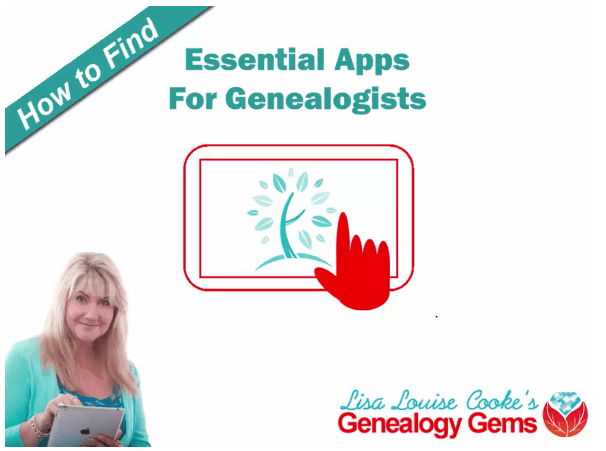
How to Find Genealogy Apps: New Premium Video
There’s a new video tutorial on genealogy apps for Genealogy Gems Premium website members: “How to Find Essential Genealogy Apps for Genealogists.”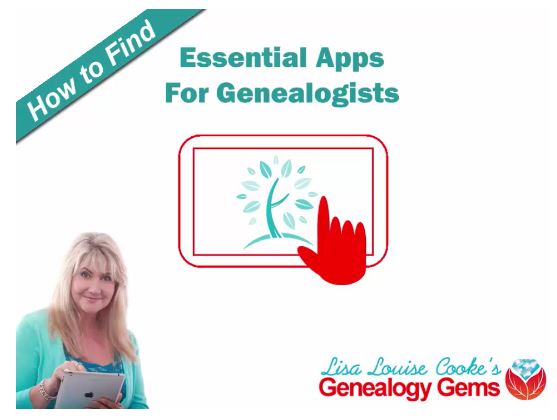
What are the best apps for genealogy? The ones that accomplish whatever you want to GET DONE. Like:
- consulting
- working on your family tree
- translating an old church register
- digitally restoring an old photo.
- Having your mobile device read you an e-book or blog post (yes, you can do this for free).
But to make the most of the many mobile tools out there for the genealogist, you need to strategically look for them rather than hope you stumble across them. Because most of them aren’t conveniently marked “for the genealogist.”
A new 36-minute video tutorial by leading tech genealogy educator Lisa Louise Cooke shows you how to get the most out of your mobile device for genealogy. In “How to Find Essential Genealogy Apps for Genealogists (and 3 to Start Using Right Away)” she covers:
- How to identify mobile-friendly tasks you want to accomplish;
- Apps that every genealogist can enjoy right away;
- Knowing where to look for apps;
- Automating the process of finding apps; and
- How to keep from purchasing apps you don’t need.
Get the Book! 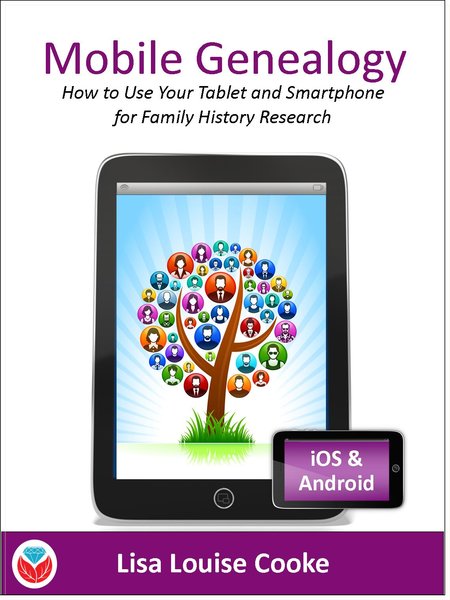
These tips are taken from hundreds of hours of research and testing Lisa put into her new book Mobile Genealogy: How to Use Your Tablet and Smartphone for Family History Research.
Save 10% off Mobile Genealogy
with Coupon code web10
Premium Membership
 The How to Find Essential Genealogy Apps for Genealogists video is one of nearly 30 full-length video tutorials (and an Evernote mini-series tutorial) that you will have access to as a Genealogy Gems Premium Member. To learn more about membership, click here.)
The How to Find Essential Genealogy Apps for Genealogists video is one of nearly 30 full-length video tutorials (and an Evernote mini-series tutorial) that you will have access to as a Genealogy Gems Premium Member. To learn more about membership, click here.)
More on Genealogy Apps and Mobile Genealogy
How to Use Your Mobile Device for Genealogy: Free Video
3 Tips for Getting the Most Out of Your Mobile Device
Tools to Highlight Your Great Genealogy Finds: Snagit and Skitch
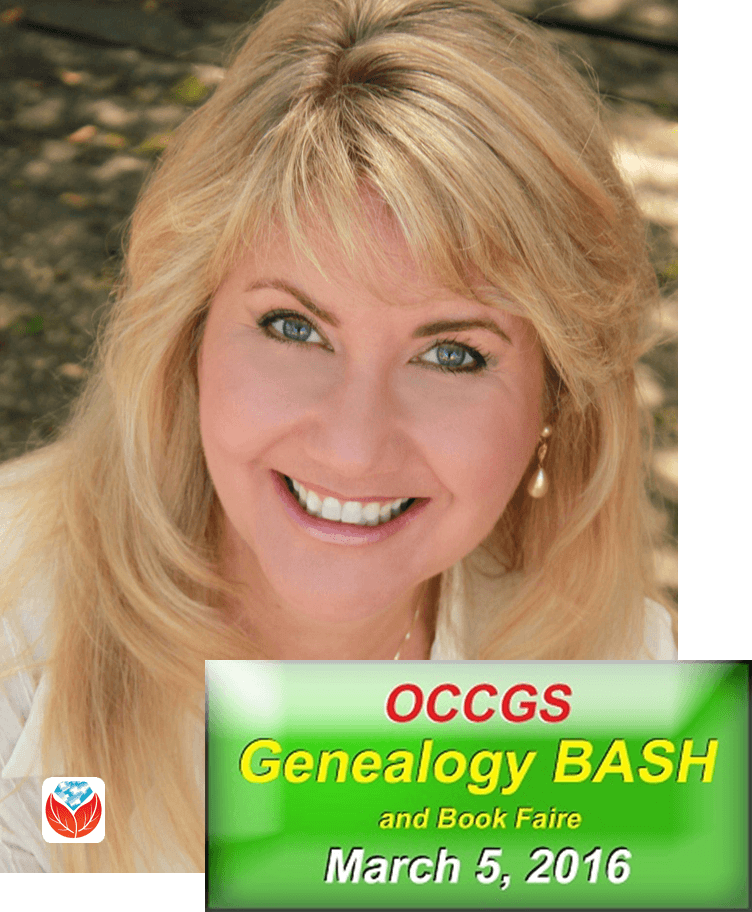
Lisa Louise Cooke Coming to CA: OCCGS Genealogy Bash
Are you in or near Orange County, California? Come see Lisa Louise Cooke this weekend at the OCCGS Genealogy Bash!
On March 5, 2016, Lisa Louise Cooke will be speaking at the Orange County, California Genealogical Society. “A Day with Lisa Louise Cooke” Genealogy Bash and Book Faire will have something for everyone! Lisa will be giving four of her popular lectures:
- Google Tools & Procedures for Solving Family History Mysteries
- Google! Everything New that You Need to Know for Genealogy
- How to Reopen and Work a Genealogical Cold Case
- Future Technology and Genealogy
WHAT: Lisa Louise Cooke at the OCCGS Genealogy Bash
WHEN: March 5, 2016
WHERE: Huntington Beach Central Library, 7111 Talbert Ave., Huntington Beach, CA
REGISTER: Click here for more information
In addition to Lisa’s lectures, the OCCGS Genealogy Bash will offer:
- A huge genealogy book sale (bargain prices for over 1000 books),
- Free beginners classes (limited seating–see the society website) and
- Chances to win fabulous prizes, including a year’s Ancestry World membership worth $300, a 3-day stay at the Salt Lake Plaza Hotel, and other prizes worth a total of $2000.
The day before, on March 4, Lisa will be at Aliso Viejo Library (OC Public Library system) in Laguna Hills, California. She’s teaching Google Earth for Genealogy at 10:00 am.
Attending both days will give you the ultimate Google for genealogy experience: Lisa’s Google search methodology PLUS her unique take on Google Earth. You’ll come away with powerful new tools and strategies for finding your family history in free Google resources that are literally at your fingertips every time you go online.
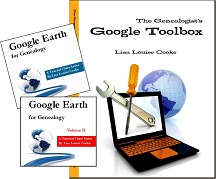
Learn all these Google skills–with step-by-step tutorials and video demonstrations–in Lisa’s book and Google Earth video tutorial. Click here for a special price on the bundle!
Can’t attend? You can still learn Google expertise from Lisa in her book The Genealogist’s Google Toolbox (2nd edition completely updated in 2015) and Google Earth for Genealogy, a 2-CD set that’s also available as a digital download. Purchase these products individually by clicking on the links above, or bundle and save!
More Google for Genealogy Gems
Google Earth for Genealogy: A Free Video Introduction
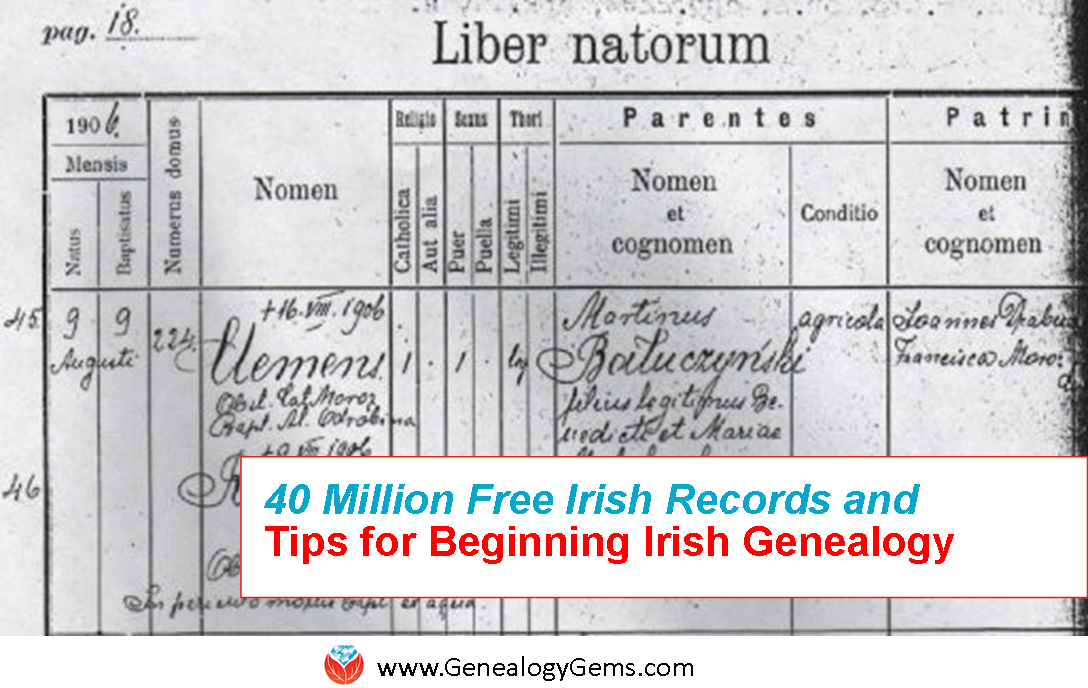
Beginning Irish Genealogy Tips
Here are 3 essential tips for beginning Irish genealogy from Brian Donovan, Head of Irish Data and Development at Findmypast. Plus we’ll highlight Findmypast’s enormous collection of Irish records.
It’s March now, and time to start celebrating all things Irish! Findmypast.com is one of the best resources for Irish genealogy research, thanks to their enormous index of Irish Parish Records (1670-1900). The index has 40 million names from 1,000 parishes across all 32 counties of Ireland and links to digitized content at the National Library of Ireland.
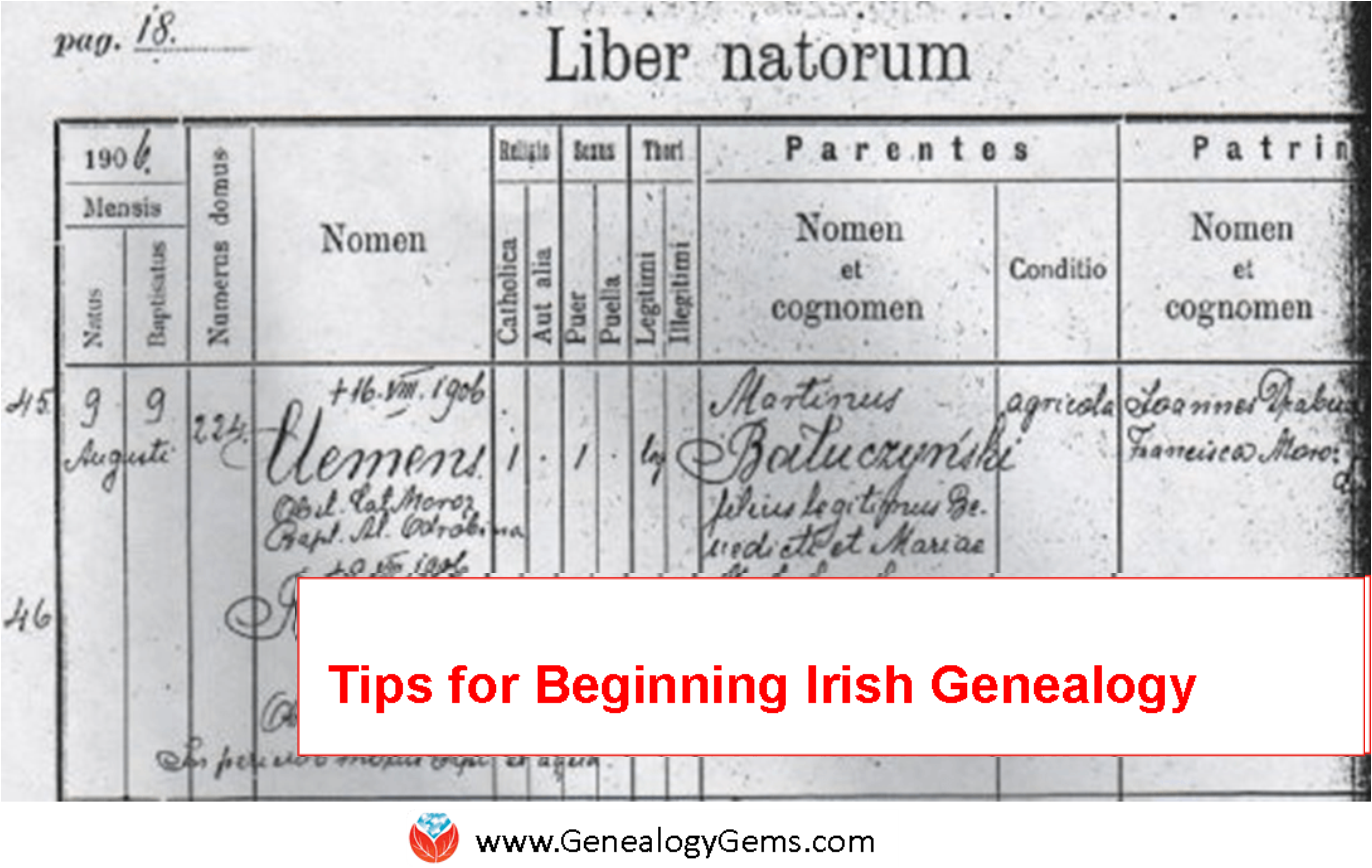
According to Findmypast, parish records are “the most important resource for Irish ancestors prior to the 1901 census, allowing researchers to trace their roots back to Pre-Famine Ireland.” Let’s hear from Findmypast’s Irish research expert to help you get started in finding your Irish ancestors.
Beginning Irish Genealogy: Tips to Get Started
It can be intimidating to start researching Irish genealogy. I asked Brian Donovan, Head of Irish Data and Development at Findmypast, to answer 3 key questions: 
Q: How do I know if I’m ready to “cross the pond” back to Ireland? What information should I have?
A: Before looking through Irish records…you’ll want to know as much as you can about the origins of your immigrant Irish ancestor. Obviously you’ll need to know their name and date of birth, but the really key piece of information is their place of birth – that’s absolutely essential, especially if you have a common last name. At minimum, you would need to know the county, but knowing the parish or townland is even more helpful. With our new parish records, however, it’s much more possible to make progress knowing only the county. Additionally, knowing the names of other family members, such as their parents or siblings, buy hypothyroid medication will also help locate your Irish family before they left.
Q: What are the first Irish records I should search? Does that change by time period?
A: It definitely depends on the time period. If you know your ancestors migrated after 1901, that’s easy – start with the 1901 Census of Ireland. If they left Ireland prior to that, focus on the civil registers of birthsand of course the parish records. Civil registration began in 1864, so if they [left] before that, your best option is to look in the parish records and land records (like Griffith’s Valuation). This is why we’re so thrilled to be releasing these parish records: a huge portion of Irish emigrated before 1864, so prior to this release the only major record sets to work with were land records (though there are others that can be helpful too).
Q: What language or languages should I expect to encounter in Irish records?
A: Mostly English, but some parish registers are in Latin, the official language of the Catholic Church during the time period the records span. Irish was widely spoken and many people could only speak Irish, but the language was never used in official records.
More Irish genealogy resources:
Are you just beginning Irish genealogy? Find more great tips for getting started here. Book Club Gem: Suggested Read for Irish-Americans 




